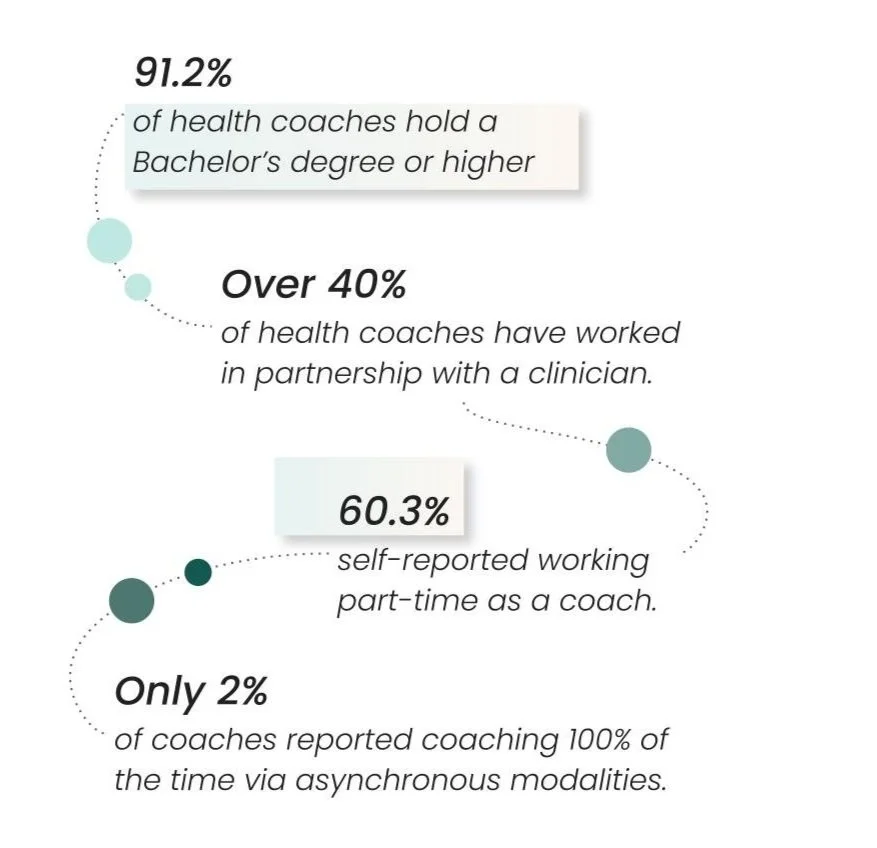The State of Health Coaching
USF College of Public Health and Pillar, a venture-backed infrastructure technology company that powers white-labeled coaching programs for healthcare and digital health companies, published the latest industry study on the state of health coaching, with data from over 1,000 coaches.
Introduction
Research shows there’s tremendous value in embedding health coaches as the front line of patient care to empower individuals with the skills and tools to advance their own health and well-being through behavior change and lifestyle management support. Despite a robust set of evidence demonstrating the clinical efficacy of health coaching, the term coach remains poorly understood, often leading to stakeholder confusion with respect to qualifications, scope and applications in patient care.
Table of Contents
Section 01: Introduction pages 3-6
An introduction to health coaching and study design.
Section 02: Coach Qualifications pages 7-9
Education, training & demographic detail.
Section 03: Target Population pages 10-12
Understanding best-fit populations and areas of focus.
Section 04: Employment & Compensation pages 13-14
Employment status, worksites & compensation data.
Section 05: Caseload & Program Design pages 15-17
Data on average weekly caseload, frequency and session length.
Section 06: Takeaways & Acknowledgements pages 18-19
Study-wide reflections for the future of health coaching.
A comprehensive review of the health coaching industry
As health coaching continues to rise as a best practice in innovative care models, our aim is to advance the integration of health coaching into patient care by highlighting industry data to inform the structure, delivery and design of coaching programs recognizing it’s clinical impact across target populations. More than 323 peer-reviewed studies including 107 randomized clinical trials published over eighteen years demonstrate the clinical efficacy of health coaching to improve health outcomes and reduce the cost of care.

For partners.
Connect with our partnerships team to learn more about the Pillar offering.
For coaches.
Join our network for access to job opportunities, mentorship and more.
A Guide to Implementing Coaching
-
1. Coach Selection
Finalize coach selection criteria based on your target population and program objectives, including: coach certification, years of experience, focus areas(s). Proper vetting ensures a demonstrated coaching ability via preferred delivery channels.
-
2. Case Load & Pay
Empower coaches to do their best work in an effective and sustainable capacity by establishing weekly caseload expectations and an appropriate hourly rate that meets the demand for flexible working hours and part-time roles.
-
3. Programming & Cadence
Consider video as a primary modality given prevalence; however, coaching can vary in format based on stakeholder needs to include telephonic and async communication. Other considerations are duration, frequency, and curated content.
-
4. Coaching Delivery & Tools
Streamline operational efficiency and engagement tracking with a coaching-specific platform that unifies the messaging, scheduling and patient management functionality, as well as seamlessly integrates with legacy technology.
About the Authors
Dr. Jennifer Bleck is an Assistant Professor at the University of South Florida’s College of Public Health and National Board Certified Health & Wellness Coach. She teaches undergraduate and graduate coaching courses, with a research focus on young adult mental health and the evaluation methodology of wellness coaching and health promotion programs. Dr. Bleck has a Master’s of Public Health in Evaluation Sciences and a PhD in Public Health.
Pillar is a venture-backed technology company that scales care management programs for healthcare partners. The company’s digital-first platform and white-labeled coach network enable partners to deploy care advocates for community and population health initiatives. Pillar is female founded and backed by top-tier investors including Y Combinator, Streamlined Ventures, as well as industry-leading founders and operators in healthcare.

“Moving the spectrum beyond physicians to include health and wellness coaches dedicated to helping the public with lifestyle improvement is part of our long-term vision.”
— Donald Melnick, MD, Fmr. President, National Board of Medical Examiners

